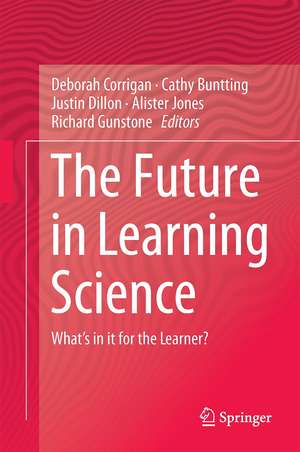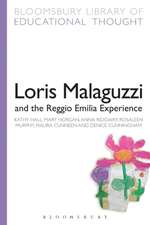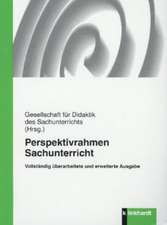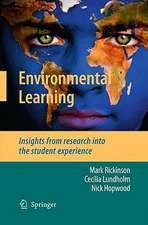The Future in Learning Science: What’s in it for the Learner?
Editat de Deborah Corrigan, Cathy Buntting, Justin Dillon, Alister Jones, Richard Gunstoneen Limba Engleză Hardback – 11 sep 2015
| Toate formatele și edițiile | Preț | Express |
|---|---|---|
| Paperback (1) | 641.38 lei 6-8 săpt. | |
| Springer International Publishing – 22 oct 2016 | 641.38 lei 6-8 săpt. | |
| Hardback (1) | 647.59 lei 6-8 săpt. | |
| Springer International Publishing – 11 sep 2015 | 647.59 lei 6-8 săpt. |
Preț: 647.59 lei
Preț vechi: 761.87 lei
-15% Nou
Puncte Express: 971
Preț estimativ în valută:
123.95€ • 128.91$ • 103.87£
123.95€ • 128.91$ • 103.87£
Carte tipărită la comandă
Livrare economică 14-28 martie
Preluare comenzi: 021 569.72.76
Specificații
ISBN-13: 9783319165424
ISBN-10: 3319165429
Pagini: 270
Ilustrații: XV, 299 p. 11 illus.
Dimensiuni: 155 x 235 x 22 mm
Greutate: 0.62 kg
Ediția:1st ed. 2015
Editura: Springer International Publishing
Colecția Springer
Locul publicării:Cham, Switzerland
ISBN-10: 3319165429
Pagini: 270
Ilustrații: XV, 299 p. 11 illus.
Dimensiuni: 155 x 235 x 22 mm
Greutate: 0.62 kg
Ediția:1st ed. 2015
Editura: Springer International Publishing
Colecția Springer
Locul publicării:Cham, Switzerland
Public țintă
ResearchCuprins
The Future in Learning Science: Themes, Issues and Big Ideas. Cathy Buntting, Richard Gunstone, Deborah Corrigan, Justin Dillon and Alister Jones.- Learning for a Better World: Futures in Science Education, Michael Reiss.- Connoisseurs of Science: A Next Goal for Science Education? Peter Fensham.- When Science Changes: The Impact of ICTs on Preparing Students for Science Outside of School , Marie-Claire Shanahan.- Forms of learning in senior secondary science as represented through an integrated curriculum, May Cheng.- Pursuing different forms of science learning through innovative curriculum implementation, Greg Lancaster, Debra Panizzon and Deborah Corrigan.- Reconceptualising the Learning and Teaching of Scientific Concepts, Colette Murphy.- Making Science beyond the Classroom Accessible to Students, Léonie Rennie.- Children Learning Science in and for a Participatory Culture, Bronwen Cowie and Elaine Khoo.- The Elephant in the Room: Emotional Literacy/Intelligence, Science Education, and Gender, Brian Matthews.- Initiatives to Prepare New Science Teachers for Promoting Student Engagement, Shirley Simon and Paul Davies.- Futures Thinking in the Future of Science Education, Cathy Buntting and Alister Jones.- Revealing Questions: What are Learners Asking About? Amy Seakins.- The Potential of Digital Technology for Science Learning and Teaching—The Learners’ Perspective, Neil Selwyn and Rebecca Cooper.- Facilitating Change in Science Teachers’ Perceptions about Learning and Teaching, John Loughran and Kathy Smith.
Textul de pe ultima copertă
This volume considers the future of science learning - what is being learned and how it is being learned - in formal and informal contexts for science education. To do this, the book explores major contemporary shifts in the forms of science that could or should be learned in the next 20 years, what forms of learning of that science should occur, and how that learning happens, including from the perspective of learners. In particular, this volume addresses shifts in the forms of science that are researched and taught post-school – emerging sciences, new sciences that are new integrations, “futures science”, and increases in the complexity and multidisciplinarity of science, including a multidisciplinarity that embraces ways of knowing beyond science. A central aspect of this in terms of the future of learning science is the urgent need to engage students, including their non-cognitive, affective dimensions, both for an educated citizenry and for a productive response to the ubiquitous concerns about future demand for science-based professionals. Another central issue is the actual impact of ICT on science learning and teaching, including shifts in how students use mobile technology to learn science.
Caracteristici
Considers future possibilities for science learning from the perspective of learners Argues for 21st century advances in science to be reflected in what is learned in school science Discusses the impact of ICT on science learning and teaching? Includes supplementary material: sn.pub/extras







